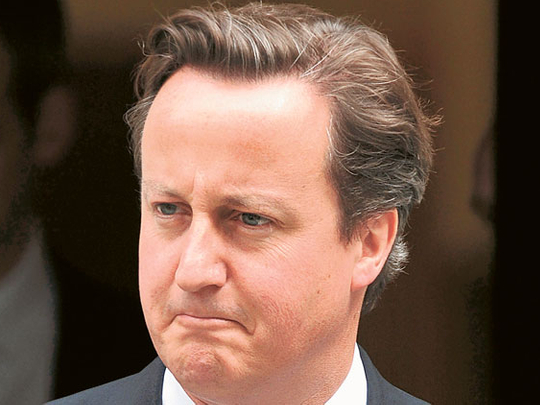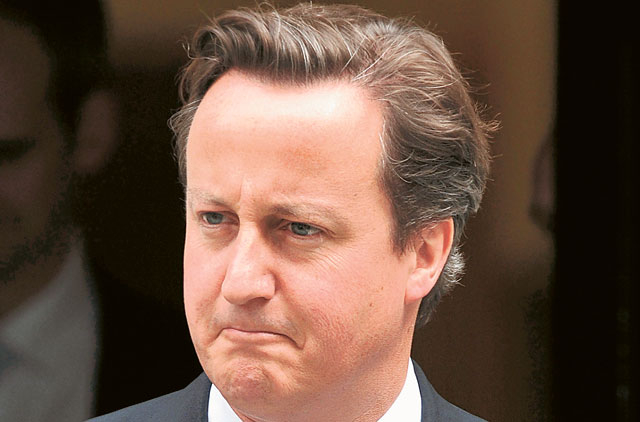
There is a giant clock hanging at Tory headquarters, installed by the party chairman, Grant Shapps, in more optimistic times, counting down the minutes to the next election. It was designed to focus minds on the campaign, but lately it’s taken on a more ominous meaning: rather like the timer ticking away on a bomb.
Recently, a Tory MP with deep pockets hired a leading pollster to conduct a strictly private bespoke survey on his chances of keeping his seat. The verdict: his 1,500 majority would vanish in a landslide, leaving Labour 7,000 votes ahead. When he shared the figures with a gaggle of colleagues, reports one rebel Tory, “one of them pointed to himself and about four others and said ‘We’re ******’. I’m starting to wonder now if this could be as bad as 1997 again.” Tick, tick, tick.
The idea of a Labour landslide in 2015 may stretch credulity to breaking point, but the growing consensus at Westminster is that the writing’s on the wall for David Cameron. The Conservative Cassandra, Lord Ashcroft, predicts a bloodbath if the election were tomorrow. Only 7 per cent of Tory voters think they can win outright, according to a poll ConservativeHome presented to its optimistically titled “Victory 2015” conference.
No wonder Liam Fox, who is to leadership crises as cuckoos are to spring, was tub-thumping about tax in the papers. More interestingly, Theresa May is now openly limbering up in the wings, boldly unveiling her own personal growth strategy at the weekend and pitching herself as a champion of unloved blue-collar Conservatives. Tumbrils roll, knitting needles click. Taxi for the prime minister, surely?
One of the hardest things to understand about politics is why it doesn’t quite work like this. What looks screamingly obvious from the outside is almost always less clear-cut from the inside, which is one reason why ousting any leader tends to be a maddeningly slow process. You’d surely be mad to bet on David Cameron lasting. But you might also be right. It’s the rebels who naturally hog the media limelight, but the boring truth is that large numbers of Conservative MPs remain either resolutely loyal to Cameron or fairly easily bought. Some want a lurch to the right, some to the left easing up on austerity, doing more for the low-paid and some would frankly settle for a lurch to competence. “I was feeling pretty down but more and more now, this feels like it’s going to be another 1992,” says a bright young minister, convinced Labour will blow it at the last minute.
Some in Labour, it should be said, fear the same. “We need to actually go out and win it, not just assume everything’s falling into place,” says a shadow cabinet minister worried his party’s poll lead is far softer than it looks.
But the biggest obstacle to regime change is psychological, not psephological. The old cliche that lingering guilt about ditching Margaret Thatcher holds Tories back from regicide is outdated, with much of the new intake too young to remember that collective trauma. It’s more that sometimes the knowledge of impending doom doesn’t galvanise a party into action, but makes it curl up into a ball. Those Tories who have discreetly swapped notes with Labour friends about the grim creeping paralysis of Gordon Brown’s final years hear much that sounds familiar.
The truth is that a party losing faith in its leader often resembles not so much a gang of crazed assassins as a bunch of embarrassed commuters on a late-night train, all studiously not looking at the drunk squaring up to his unfortunate neighbour, silently praying someone else will do something so they don’t have to.
Sociologists have an explanation for this collective passivity and it’s known as the bystander effect. It’s classically demonstrated by staging a fake emergency in a crowded public place, and then again in front of a lone passerby. The natural assumption is that the victim would be safest surrounded by people, but over and over again the experiment finds lone individuals are actually more likely to come to the rescue. They feel a more intense responsibility to the victim, because they know if they don’t help then nobody will. But in a crowd people typically hang back, all waiting to see if someone else responds: our instinct is to copy what others do which since they’re all waiting and watching too, tends to be nothing and the sense of responsibility becomes dangerously diffuse.
And that’s as good an explanation as any for why backbench crowds sometimes hold back even when their electoral prospects are being kicked to death in front of them. By 2009, you could barely find a sentient Labour MP who thought Brown could win. But when pressed on what they planned to do about that, they’d shrug helplessly: it was the wrong time, or the wrong candidate, or any one of a million other silent prayers for someone else to do something. If it takes 25 names to trigger a leadership challenge, a shadow cabinet minister once told me at the height of plotting against Iain Duncan Smith, any idiot can get 24: but it’s hell getting the 25th, because nobody wants to be the one who decisively makes it happen.
It’s true that the camp around Adam Afriyie is if nothing else pushing the pace, forcing May and others to advance what had been relatively vague preparations for any post-2015 contest. And there is intriguing talk of Boris Johnson finally moving to tackle his key perceived weakness, the perception that he’s too erratic and too lazy for the top job, by seeking to form a joint ticket with Michael Gove. The education secretary is not only one of Boris’s surprisingly few close friends, but is the kind of sober, industrious and long-suffering individual Johnson has needed as his deputy in any job he’s done. All this creates a growing risk that Cameron could be challenged before 2015.
But if he isn’t, that will have less to do with numbers and plots and reading of runes from the spring’s council elections than with two simple human factors. The first is that hope springs eternal: politicians like to believe something will turn up to save them, and surprisingly often it does as with Nick Clegg, miraculously resurrected by Eastleigh. But the second is that most MPs are natural bystanders, rubbernecking the crash as they pass but convincing themselves someone else is best placed to help. And managing not to see the oncoming juggernaut on their side of the road until it’s too late.
- Guardian News and Media 2013
Gaby Hinsliff is former political editor of the Observer









